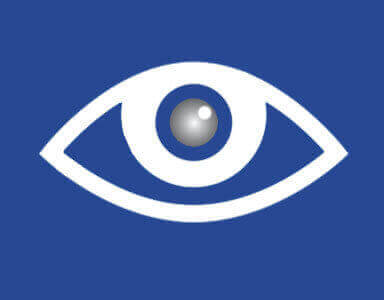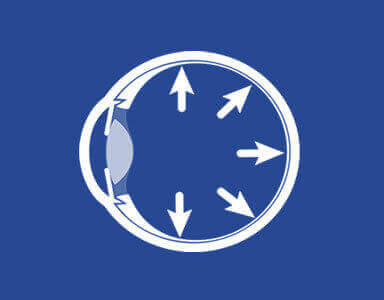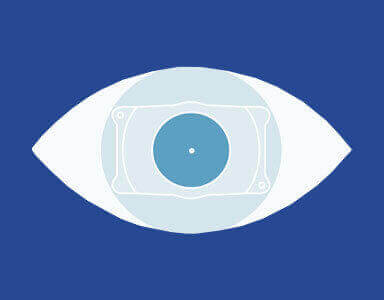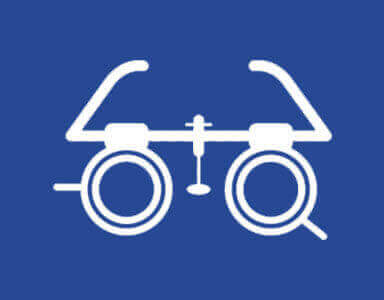
Cataract Surgery
Cataracts are a common occurence among the majority of the aging population and is descirbed as the development of opacity in the eye. Cataracts cause blurred or hazed vision making it difficult to perform simple activities such as reading a book, recognizing shapes, and in worst cases impeding driving and recognition of facial expressions.
A cataract is said to develop when protein aggregation occurs in the eye from damage, diabetes, genetics, lifestyle, and the natural aging process.
The good news is that cataracts are reversible in a single-day procedure, where patients can get back to their routine within 24 hours of the corrective surgery. After the surgery, the patient's original clear vision is restorable.
At Baabaji Nethralaya, we realize the uniqueness of each patient and are committed to providing personalized eye care and treatment for Cataracts.
What are cataracts?
A cataract is a gradual decrease in vision caused by the clouding of the lens inside the eye. It is a typical sign of aging and is found prevalent in more than half of the population over the age of 65 in India.
People with cataracts describe their vision as viewing through a messy or blurry window.
Thankfully, with advancements in science and surgery, cataracts can easily be rectified.
How Are Cataracts Formed?
Cataracts result from the natural aging process. It is still not precisely understood what exactly prompts cataracts, but scientists have distinguished a few factors that might be connected with cataract development including:
- Family History
- Diabetes
- Obesity
- Hypertension
- Smoking
- Significant Alcohol Consumption
How Are Cataracts Treated?
The great news is that cataracts are easily curable with a simple surgical technique. The process involves the replacement of the clouded natural lens with a clear intraocular lens.
Symptoms of cataract
- Blurred or dim vision
- Sensitivity to light
- Fading of color
- Difficulty with night vision
- Difficulty in recognizing facial expressions of others
Cataract Surgery Overview
Cataracts Surgeries are a single-day procedure completed in an hour. This procedure is simple and painless. There is very little aftercare required post-cataract surgery, and it does not impede any day-to-day activity.
When should I opt for surgery?
When everyday activities such as reading become difficult, it is advisable to immediately consult your opthamologist.
What will my recovery be like?
Most patients return back to normal activity 24 hours post-surgery. However, the doctor will be able to asses the situation and give personalized advice.
How long does cataract surgery take?
The surgery is a same-day surgery procedure and takes about 1 hour.
Is cataract surgery painful?
No, you do not feel any pain during surgery, but you may feel a certain heaviness in the eyes as the procedure requires an addition of a certain jelly to keep it from going dry.
Baabaji Nethralaya ® Custom Cataract Solutions - For your eyes only
Since no two eyes are ever the same, Baabaji Nethralaya is satisfied to offer two energizing new ways to deal with cataract surgery: ******** ® and ******** ®plus.
When a cataract develops, your vision is shady or hazy with poor low-light or night vision, Baabaji Nethralaya® Custom Cataract Solutions might be the ideal answer for you.
Through an extensive arrangement of customized estimations, we can prescribe the ideal IOL (Intra Ocular Lens), to give you the most ideal visual result. Baabaji Nethralaya® Custom Cataract Solutions might be the ideal answer for you.
This new approach results in clear, brighter, better quality vision with upgraded contrast, for example: driving at nightfall, haze, shower, and even at dim-lit eateries becomes effortless.
At Baabaji Nethralaya, we can assure you in delivering the best personal care with subtlety and precision. Our Cataract services are:
- Custom-designed to suit you
- Optimized quality and clarity of vision
- Colours might be brighter and clearer
- Improve night and low light vision
- May decrease the requirement for glasses for close or separation
Furthermore, Baabaji Eye Care ® is dedicated to ensuring that the patient does not experience the downfalls of astigmatism, as we are currently trying to rectify this with Toric IOLs, enhancing your vision fundamentally and decreasing the requirement for glasses post-operatively.
Since your eyes are a remarkable and precious creation-our amicable and committed group at Baabaji Nethralaya can provide you with a cataract arrangement that is intended for you.

Contact Lens
Contact lenses are an alternative for spectacles and enable the user with a hassle-free experience. It is important to choose the right kind of contact lens and we at Babaji Nethralaya are here to provide you with the best!
What are the types of contacts available?
There are many different types of contact lenses, and it is best to use the one prescribed by the opthalmologist. Some of the ones we offer at Babaji Nethralaya are:
- Silicon hydrogels
- RGP lenses
- Scleral lenses
- Disposable lens
What is the advantage of using a silicone hydrogel lens?
Silicone hydrogel lenses are very porous and hence allow more oxygen, which prevents issues such as hypoxia.
What is an RGP lens?
Rapid gas permeable lenses, also commonly known as RGP lenses, are less rigid and also permeable to oxygen. This ensures that the user does not develop any eye irritation.
What is a scleral lens?
Scleral lenses are prescribed especially to those who have been incompatible or have faced issues in the past with other types of contact lenses.
These lenses are better and have a lot of advantages, such as :

Glaucoma Services
What is Glaucoma?
Glaucoma is a disorder that affects the optical nerve of the eye because of increased intraocular pressure. The condition affects the signals relayed to the brain and causes visual disturbances, and in extreme cases, can also lead to blindness. When treated with the right care and at the right time, such extreme situations can be easily avoided.
What causes glaucoma?
Glaucoma occurs due to the buildup of pressure in the eye. The exact reason on why intraocular pressure increases is still unknown.
Is glaucoma common among people?
Glaucoma is common among people above the age of 40.
What are the symptoms of glaucoma?
The symptoms vary from person to person. However, a few common symptoms are:
- Morning headaches
- Haloes
- Red eyes
- Eye pain
In severe cases :
- Nausea and vomiting
- Total vision impairement
How are glaucomas diagnosed?
They are diagnosed by Applanation Tonometry- this method measures the pressure of the fluid inside the eye. It is a sensitive and efficient diagnosis method and can detect any changes in pressure, even before clinical symptoms appear.
What is a YAG laser iridotomy?
It is a procedure used to create a small hole in the iris, which allows the fluid to drain outwards and relieve the pressure. It is a simple and efficient procedure used to treat or prevent glaucoma.

ICL Surgery
An ICL, also known as an Implantable Collamer Lens, is a unique and novel technology in which the biopolymer known as "Collamer" is used to make the implantable lens, which is perfectly compatible with the human eye and resistant to UV rays.
An ICL is an alternative to Lasik to correct near or far-sightedness and is a painless procedure. ICLs are a permanent solution to reduce dependence on contact lenses and glasses, and the best part? An ICL is bio-compatible and thus lasts a lifetime!
We at Baabaji Nethralaya are committed to delivering the best ICL procedure with subtlety and precision through our dedicated team of experts in eye care.
What is an ICL?
An Implantable Contact Lens is made up of a biopolymer known as "Collamer," and is implanted in the eye to amend near and far sightedness.
Is an ICL the right choice for me?
ICL procedures have been proven to be safe. However, there are a plethora of factors which can determine whether the patient can undergo the procedure, such as:
Age factor- the FDA approves ICL procedures for those between 20- 45 years of age.
Refractive errors- An ICL can be determined based on the type of refractive error in the eye and also the level of focussing error.
Compatibility with other procedures- In case the patient is not compatible with procedures such as Lasik, an ICL would be an option to consider.
Last but not the least, getting an ICL procedure would be dependent on the individual expectation from the surgery.
Is there any valid reason I wouldn't be appropriate for Lasik eye surgery?
Lasik surgery has been a highly successful and popular procedure around the globe. But, there are certain conditions where Lasik might not be the right procedure for the patient, such as: having a high level of refractive aberration, presence of any comorbidities, and lifestyle. For those under a high risk of catching an infection, a Lasik is definitely not advised. In such conditions, an ICL is preferable as it does not debilitate the cornea and is a much safer option.
How 'proven' and safe is it?
ICLs have been proven safe by the USFDA and have also proven to be an emerging top choice as a corrective procedure with more than 2 million implantations. Research has found a substantial level of safety associated with ICLs, as there is a lower risk of infection, and they also do not cause dry eye syndrome, unlike other corneal procedures.
What is the Lens made of?
It is made of a biopolymer known as "Collamer," derived from a naturally occurring protein known as Collagen. Biopolymers are absolutely safe to use and do not react with the body's immune system.
Since an ICL is biocompatible, it does not react with the body and can stay forever unless there are changes in eyesight. They are also resistant to UV rays.
Who is appropriate for an ICL?
Patients who are especially appropriate for this lens are as per the following:
- Deficient corneal thickness for a Lasik eye surgery
- Forme Fruste or Clinical Keratoconus
- Past herpetic eye disease
- Astigmatism (Myopia) > -8D
- Far-Sightedness (Hypermetropia) >4D
- Far-Sightedness (Hypermetropia) >4D 6)Collagen vascular illness or different contraindications for Lasik.
Patients who are especially reasonable for this lens are as per the following:
Little eyes (lacking front chamber profundity (<2.8mm))
Sporadic astigmatism rendering poor BCVA
Glaucoma
Cataracts
Why choose ICL?
ICLs are gaining fast-paced demand for their versatile properties and minimal post-operative care. Some top reasons to consider an ICL are:
Biocompatibility of the lens with the human system reduces the risk of infection and hypersensitivity reactions.
The implants are easily removable and can be reversible.
Offers sharp and crisp vision since they are placed close to the nodal point.
Does not cause dry eye syndrome.
What is the best thing about an ICL?
An ICL preserves the corneal tissue and does not pose a risk of damage. They are also a boon for patients with thin corneas.An ICL also offers a wide correction range from -0.5D to -18D , which makes it the best!
What would I be able to expect after an ICL insert?
What is the recuperation time frame?
ICL Implants have a recuperation period similar to present-day LASIK eye surgery. After the surgery, there is a buffer time of about 4 hours until the patient can see clearly. All patients have accomplished an extremely acceptable level of vision within 24 hours of the surgery.
Why does it cost more than LASIK surgery?
Compared with LASIK eye surgery the ICL method uses a costly embed made to top-notch Swiss principles. The ICL is not held in stock and is requested, couriered, and in some cases 'hand-made' to fit a particular patient's eye, in this way creation expenses are noteworthy.
Is the ICL visible to others?
No, it is placed behind the iris and is not visible to others.
Can you watch TV after the procedure?
It is advisable to not strain the eye upto 24 hours after the procedure.
Will I feel pain after the surgery?
Initially, there might be a minor sensation of a foreign particle in the eye, which will quickly settle upon blinking.
Will an ICL affect my night vision?
No, ICLs are known to enhance contrast sensitivity. This implies that anyone with the implant can see well in dimly lit places too.
What are the dangers?
- Risks
Although there is a chance of infection and other complications in any procedure, it was found that the level of risk in an ICL procedure is significantly low compared to other procedures.
2. Duration
The second eye can undergo the procedure within 2-days of the first procedure, yet some cases may take 1-2 weeks. It is advisable for those living outside the city to stay an extra day post-procedure for observation.
Will I feel anything during the surgery?
ICL is performed using anesthetic eye drops that eliminate sensation and pain during the procedure.

Optical Services
Optical services are a range of services aimed towards making diagnosis and finding the right solutions for refractive errors such as myopia, hyperopia, astigmatism, and so on.
What are some general eye care tips?
- Eat a balanced diet
- Excercise
- Have a short screen time
- Ensure you wear protective eyewear while going out
- Ensure to get regular eye checkups
What are the symptoms of refractive errors?
The symptoms are but are not limited to
- Blurred vision
- Headaches
- lnability to clearly see objects placed far away or nearby.
- Seeing halos
- Eye strain
Upon the development of such symptoms, one should immediately consult an opthalmologist.
How to pick the right type of sunglasses?
The right type of sunglasses would always be to have 100% UV A and UV B protection. It is also advisable to buy oversized sunglasses as they would give wider protection.
How are refractive errors corrected?
Refractive errors are generally corrected by using glasses and lenses. In cases where one wants a permanent fix, an ICL or other surgical corrective procedures can be done.
What we offer at Babaji Netralaya?
We offer an accurate diagnosis with the help of modern technology and prescribe the best solutions to correct them.